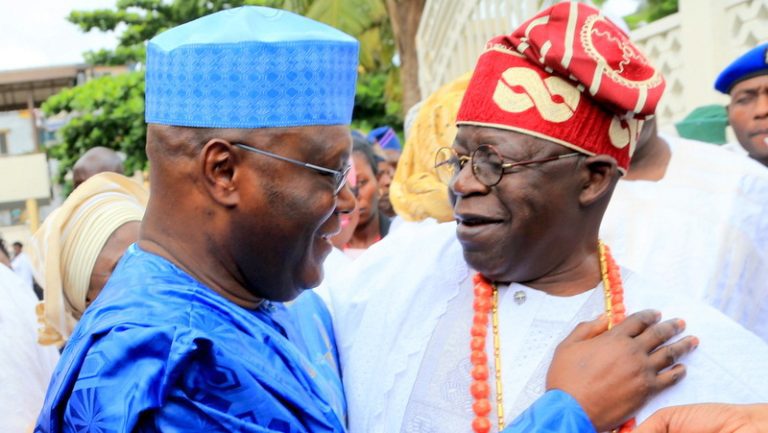■ Unlike Tinubu, Atiku is not a bigot, did not refund money to the US for alleged drug trafficking
The umbrage between President Bola Tinubu and Former Vice President Atiku Abubakar continued Monday with Atiku saying President Bola Tinubu’s economic policies and approach to governance is killing Nigerians, and this should be his focus rather than attacking the opposition which is not in the saddle.
Two weeks ago, Everyday.ng exclusively sought Atiku’s comments on what he would have done differently if he was President for the last 17 months. In response, the former number two man issued a public statement which has led to a political firestorm between political allies, turned foes.
https://everyday.ng/2024/11/03/what-i-would-have-done-differently-on-subsidy-removal-and-floating-of-naira-atiku/
On Monday, Atiku said in a statement by his Special Assistant on Public Communication, Phrank Shaibu, in reaction to a statement by the Presidency on Sunday, said, “On July 8, 2024, Tinubu announced that import duty on essential goods like food would be lifted for 150 days. But over 120 days later, the policy is yet to take off, while Nigerians continue to die daily due to increasing costs, including food inflation, which now exceeds 40%, the highest in decades.
“The brazen disobedience to a government policy by Tinubu’s appointees and the failure of the finance ministry to issue a gazette after over four months reflects the fatuousness, inanity and the incompetence that characterizes the Tinubu administration.
“Sadly, rather than focus on governance, they are preoccupied with verbally assaulting their opponents – Atiku Abubakar and Peter Obi – while using compromised courts to foster crisis in the opposition. What a shame!”
Recall that on Sunday the Presidency, in its statement by Presidential spokesman, Mr. Bayo Onanuga, titled, “TIME FOR ATIKU ABUBAKAR TO END HIS GRAND ILLUSIONS AND FANTASIES”, wrote:
He added, “Tinubu was obviously unprepared for office. He acts first and thinks of the consequences afterwards. This was why he announced an abrupt removal of petrol subsidy without any cushions. After seeing the effect, he then hurriedly decided to push a CNG initiative, which even he and his ministers have not embraced, hence their refusal to use it.
“The CNG initiative has so far failed to fully kick off because of a lack of gas infrastructure in most states. The result is that transport costs continue to soar along with prices of food.
“In his mid-term expenditure framework, he projected the exchange rate at N700/$1 in 2024 and N650/$1 by 2025. Rather than sack his economic advisers, he continues to live in a fool’s paradise, deceiving Nigerians about the FX reserve of $40bn when, in fact, the net reserves are less than 20% of that. Let the CBN release its financial statements of 2023 if he is sure of his achievements.”
Atiku described as unfortunate the announcement by the military authorities on the emergence of a new terror organization known as Lakurawa.
He argued that coupled with the incessant grid collapses in the north due to the activities of criminal elements, Tinubu ought to focus more on improving security, which is a sine qua non for investments.
The former Vice President argued that the President had decided to play politics with security by appointing his kinsmen in top security and economic positions.
“Even on the economy, he put his kinsmen in every key position beginning from finance minister, trade and investment, CBN, customs and FIRS. Even President Muhammadu Buhari was not this brazen. “Unlike Tinubu, Atiku is not a bigot. He has also not refunded money to the United States for alleged drugs trafficking. “
Despite a huge revenue challenge, Tinubu commits over $13bn to the controversial Lagos-Calabar coastal highway, rendering scores of Lagos residents homeless just to please his associates while other pressing matters are starved of funds.
Atiku advised Tinubu to make hay while the sun shines as Nigerians had grown tired of his administration.
He said the President has just barely two years left in office and he should focus on improving the lives of the people. “It is ludicrous to claim that Atiku is jealous of Tinubu. Hell no, Atiku cannot be jealous of Tinubu inflicting pains on Nigerians. Wickedness is an exclusive preserve of Tinubu and no compassionate leader who truly cares about the wellbeing of Nigerians should be jealous of what is an exclusive preserve of T-Pain”.
The former Vice President added, “It is disheartening that during the last protests, some frustrated young Nigerians were waving Russian flags and calling on the military to take over. God forbid we return to those dark days, but leaders must not push their citizens to a point where citizens choose fire over frying pan.
“Nigeria is currently the worst performing currency in Africa and is now the 5th largest economy on the continent, falling from first when the failure called APC took over in 2015. Most Nigerians are at their wits’ end, not knowing where their next meal will come from. This should be Tinubu’s biggest concern instead of fiddling while the country burns.”


